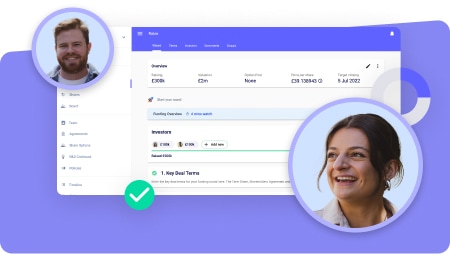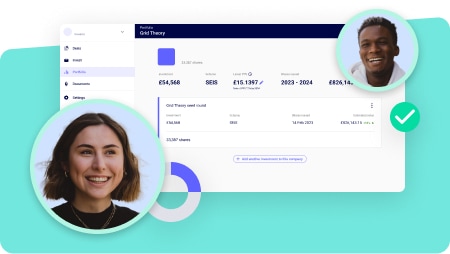Read transcript
Anthony: Every day I meet amazing founders on SeedLegals and I love helping them share their story.
So welcome to today’s founder interview where we’re talking to Rupert from Building Passport. Rupert, tell us a bit about yourself and the problem you’re solving.
Rupert: Hi, Anthony. Good to be here. So yeah, my name is Rupert Parker. I’m the founder and CEO of Building Passport. We’re solving the problem of disparate siloed building information in the real estate market.
Anthony: Okay, so I’ve got an apartment and getting information from the building people is a nightmare. There’s a WhatsApp group and there’s an email thing, they’ve lost the password on it and then there’s different Dropbox things. It’s all over the shop.
And so if this sounds like an all-in-one solution, that sounds amazing. But I’m looking at it from the point of view of an apartment owner. Your real audience are the apartment, the controllers or the landlords. Tell us more.
Rupert: Yeah, so the property owners are under a huge amount of pressure, both from a legislative perspective, but also a financial perspective. There’s a huge amount of admin time that they waste every year. We estimate north of £10,000 per managed building per year is wasted just looking for documents. And from a legislative angle, building owners can go to prison or be fined if they’re not managing this information correctly.
Anthony: Right, so this is not just ad hoc, we feel like sharing some things with you. No, if you’ve got a building that’s more than 18 meters tall, there’s now a legal requirement that this information be available to all the people in the building. Is that correct?
Rupert: It’s that and the emergency services or the building safety regulator. There’s a new element of government that’s come in to manage this. But the problem exacerbates way beyond just the residential buildings. It’s commercial buildings, industrial warehouses, et cetera.
Anthony: So this seems to be an enormous market. There are hundreds of thousands of millions of such buildings in the UK alone.
Rupert: 44 million, yes.
Anthony: 44 million. It’s unbelievable. OK. And of course, are you focused just on the UK for now, expansion later elsewhere?
Rupert: Just on the UK for now. We’ve just taken on board some US VC funding. So we will be expanding at some point. But for now, the focus is the UK.
Anthony: 44 million buildings to start is OK.
All right. So how does a platform work? It’s like a big data room for buildings?
Rupert: We’re essentially the library, librarian and smart assistant for your building. So we consolidate all the information into one place, make it accessible to the right people at the right time.
Anthony: Okay. And is there an educational piece or a network effect piece? Because presumably lots of people have got similar style buildings or the same things apply to both or the emergency services need the same access to many different things?
Rupert: Absolutely. Yeah. So the property industry from what we’ve discovered, nine out 10 of our clients who are now on board on the platform didn’t understand the liabilities that they’re under with regards to these new laws coming through, but also from a governance perspective.
Anthony: So what traction do you have so far? Do you have any notable users or customers?
Rupert: We do, yeah. Over the last year, we’ve sort of properly launched, I suppose, a year ago. We’ve onboarded clients like Sainsbury’s, Imperial College. On behalf of a London borough that I can’t mention, we’re doing a very large asset disposal programme to speed up sales, et cetera. So it’s being used for a plethora of different reasons with each of these clients.
Anthony: OK, so if you’re a building owner, particularly if it’s a larger building and you have no idea what to do, now you just go to buildingpassport.com. It’s kind of like the SeedLegals of building documentation, maybe. And you’ve got it sorted.
So what’s your background and what got you out of bed one day to go, I’m going to solve this problem?
Rupert: Yeah, so I trained as an engineer, a structural engineer, and then moved into the commercial property world for 10 years where I was a chartered surveyor. And during that tenancy or stint within my career, I was an office agent in the city. So I was buying, selling, leasing, letting office buildings on behalf of the owners. And every time we onboarded new clients, we would have to go and find all the information for a building.
One particular sort of, I guess, memory comes to mind is I think the second or third day I was an agent, I was asked to go and find a floor plan for a building. I thought, ‘Fantastic, I’ll call around the office, find out who’s got it because I don’t know where the filing is’. It was all physical.
And yeah, after two weeks of looking for this floor plan, I still couldn’t find it. I thought, ‘Maybe there’s some sort of archive room in the building’. So I ended up walking to the building, looking in a damp archive room and lo and behold in an archive box on the floor, there was a damp A3 floor plan. And at that point in time, I just thought, ‘This is ridiculous. Why is there not somewhere digital that stores this information alongside a building forever?’
Anthony: Okay, so Building Passport sounds great. I’m going to immediately, after this, tell my landlord and our WhatsApp group to make the landlord go and get Building Passport so that we can figure out everything in one place, because I have no idea where most of the things are.
All right, now, how can people get in touch with you to learn more?
Rupert: So go to buildingpassport.com – email addresses are on there. Or look me up, Rupert Parker on LinkedIn.
Anthony: Amazing. Thank you so much.
Rupert: Thanks, Anthony.
In the UK, 44 million commercially managed buildings rely on scattered, outdated, and often inaccessible documents. Property owners waste over £10,000 per building per year just searching for vital information, and with new regulations in place, missing records could mean hefty fines – or worse.
That’s where Building Passport comes in. Founded by Rupert Parker, the platform digitises and centralises essential building data, making it instantly accessible to landlords, tenants and regulators. Inspired by a frustrating experience early in his career – hunting for a missing floor plan that was eventually found, damp and crumpled, in an archive room – Rupert set out to solve a problem that affects the entire property industry.
SeedLegals Co-founder and CEO Anthony Rose, sat down with Rupert to discuss how Building Passport is transforming property management and what’s next for the company.
Key takeaways
The problem with building information
- The UK has 44 million managed buildings subject to specific legislation, yet critical property documents are often scattered, outdated, or inaccessible
- Property owners waste an estimated £10,000+ per building per year just searching for information
- New regulations require building owners to provide accessible, up-to-date records
Building Passport’s solution
- A centralised digital platform that stores and organizes key building documents in one place
- Provides instant access to landlords, tenants, regulators, and emergency services when needed
- Acts as a library, librarian, and smart assistant for building data, streamlining compliance and reducing admin time
Traction and growth
- Building Passport has onboarded major clients including Sainsbury’s, Imperial College, and a London borough
- The platform is being used for asset disposal, governance, and compliance across various property sectors
- Having secured US VC funding, the company is focused on UK expansion before scaling internationally
SeedLegals events
Connect with fascinating founders
Sign up to our newsletter and get the best of SeedLegals events delivered directly to your inbox.



















